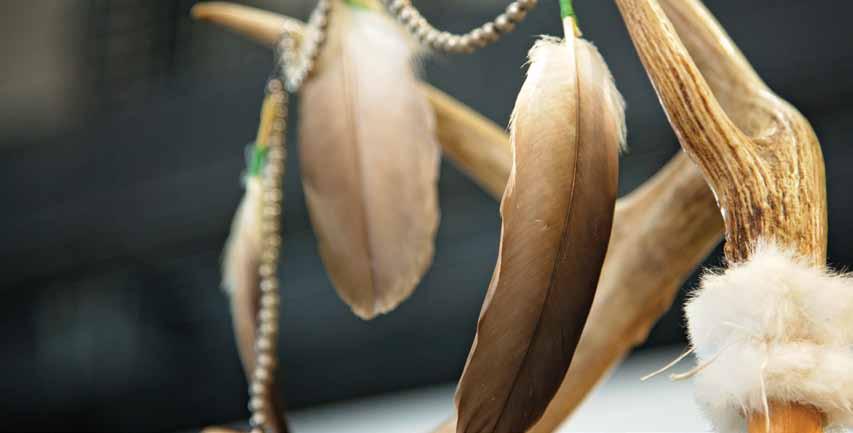
4 minute read
Treaty Governance- What is it?
By Sam Manitowabi
The term ‘governance’ is used to describe the way a group of people organize themselves in order to achieve goals and share responsibilities.
Advertisement
When we discuss Anishinabek and the relationship with the ‘Crown’, we usually speak about ‘Treaty’. Treaty Governance can then refer to the structures Anishinabek create to make decisions about how the Treaty is maintained, managed and promoted. In my research for this article, I came across an undated document produced under the guidance of Elders that had gathered some time ago, and it reads:
Anishinawbek Enahkonegawin
Ginawind gidaa zhitoonan maanda ezhiwaawiindmaageng miinwa n’waawiindmagmin ehpeeche gunawaab migwing ginawind dinawenmaaganinanik minawaa.
Mshi shi wii gnawaab migyiing G’itchi Manidoo ezhchigeyiing giinwin.
Anishinawbek Waawiindmaagewin Gwayakondiwin (wiidookodaadiwin) mdaaswaakshi-nshwaaswaakshi-naan-midna ji nakiiyiing maamwi ji kawaamdamang waa naagdooyiing gaa bizhichgewaad Anishinawbek mewzha weweni gii naagdawenmowaad kina gegoo gda kimnang, dedbinwe bemwidooyiing.
Gnishdawambdaanaa gitchitwaa wendaagog enaagdawendimamang weweni ji mnaaden mang aki (gda kiimnan) miinwaa nbi geni zhi-mnojawendagoziwin yaamang edinakii’ang miinwaa ezhkibmaadzijig geni niigaaniijigi yaamwaad.
We make this pledge and promise in witness of all our relations and in full view of G’Chi Manidoo that we the Anishinawbek Treaty Alliance of 1850 will work in unity to defend our inherent rights and promote the sovereignty of our Nation as protectors and stewards of our ecosystem within our traditional territories and our original rights.
We recognize our sacred responsibility to respectfully manage the lands and waters for the prosperity of our communities and our future generations.
This pledge, although brief, captures the spirit and intent of Treaty Governance in that it identifies that our goals, responsibilities and obligations are to defend our inherent rights, promote sovereignty, and protect our ecosystems. This pledge along with the RHW Declaration, signed on September 9, 2020, in Bawaating provides a framework of Treaty Governance for us to build upon.
The Declaration speaks about the principles of Minigoziwin (inherent sovereignty), Gichinaakinagewin (great laws), kidakiimnaan (land), and Debendiziwin (the right to govern ourselves). Through these principles, Gichimanidoo defined our responsibilities and obligations. We see Minigozowin in the Treaty, our leaders declared that “we shall always have reserved jurisdictions over our full territory, as our rights to harvest within the full extent of the territory, underlying title to the land and to a share of resource revenues were guaranteed.”
Gichinaakinagewin (great laws), given to us by the Creator, define our responsibilities and obligations to kidakiimnaan (land), and debendiziwin (the right to selfdetermination). These laws govern all our relationships to allow us to live in harmony with all creation. These responsibilities and obligations given to us cannot be altered or taken away by any foreign government. Anishinabek have occupied, exercised authority and jurisdiction over our communities, our economies and our ways of life within this territory prior to the arrival of the settlers and their foreign governments that they have since established.
Our Elders speak about Anishnaabek’s commitment to the principle of reciprocity by sharing, working together and working through any conflicts, with respect for each community to support one another, to work together on common goals and most importantly, to assert our collective rights within the territory. This principle of reciprocity must be invoked in all things we do, without it, we create an opportunity to follow the settler’s practices where one side wins and the other loses. When we take, we must compensate or give something in return, so there is balance, and enough resources for our future generations.
Next, we need to determine our structures and decisionmaking model to ensure our Treaty is maintained, managed and promoted.
Robinson Huron Waawiindamaagewin has been charged with this responsibility and have generated a ‘Protocol’ and ‘Strategic Plan’ to provide guidance on the development of structures and practices. RHW continues to work with the 21 Ogimaak on the development of a governance framework which will incorporate Ogimaak, elders, women and youth. This framework will be determined by the principles outlined in the RHW Declaration adopted on September 9, 2020. It is our hopes that we will all recognize our roles, obligations, and duties, to work together respectfully to implement all aspects of our Treaty.
Strong Treaty governance is an important foundation not only for economic development and cultural and land protection, but for the strength of First Nations as a whole. RHW consists of the signatory First Nations of the Robinson Huron Treaty of 1850, and beneficiaries within the Treaty area. Currently we meet each season. Each meeting begins with Anishinaabe customs and protocols, which will include a Feast to remind us of the promises made and understand our history. Each leader will have an opportunity to be heard and then decisions and action plans will be made on a consensus basis.
The Robinson Huron Waawiindamaagewin Ogimaak have the authority to pass laws that represent the interests of the Nation, and contribute to the preservation and wellbeing of the entire Nation, in the custom and practises of our traditions, as Creator has given us Debendiziwin.
As we continue to work, develop and grow under the guidance and direction of our leaders, RHW will maintain the right to engage, discuss, negotiate, plan and enter into agreements with any Nation or corporation that will enhance opportunities and circumstances for the Treaty beneficiaries.










